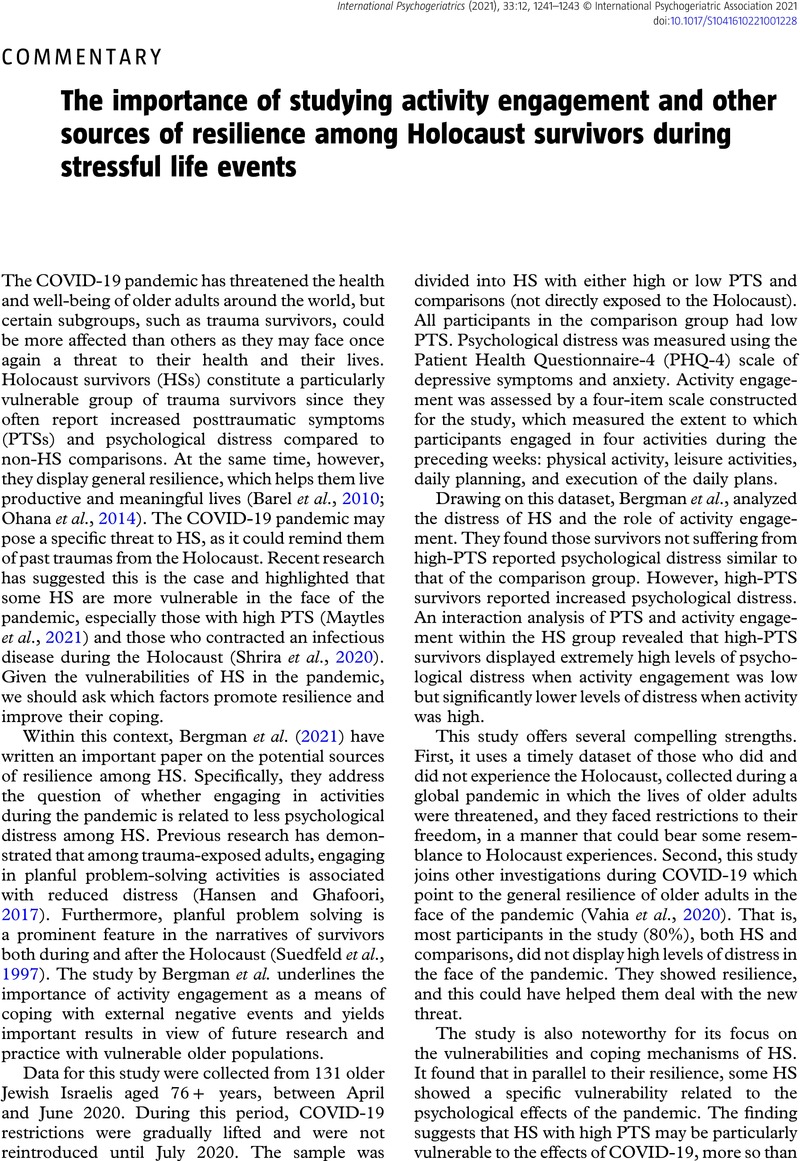No CrossRef data available.
Article contents
The importance of studying activity engagement and other sources of resilience among Holocaust survivors during stressful life events
Published online by Cambridge University Press: 24 September 2021
Abstract
An abstract is not available for this content so a preview has been provided. Please use the Get access link above for information on how to access this content.

- Type
- Commentary
- Information
- International Psychogeriatrics , Volume 33 , Special Issue 12: Issue Theme: Social Engagement and Mental Health , December 2021 , pp. 1241 - 1243
- Copyright
- © International Psychogeriatric Association 2021
References
Bachner, Y. G., Carmel, S. and O’Rourke, N. (2018). The paradox of well-being and Holocaust survivors. Journal of the American Psychiatric Nurses Association, 24, 45–52. doi: 10.1177/1078390317705450.CrossRefGoogle ScholarPubMed
Barel, E., Van IJzendoorn, M. H., Sagi-Schwartz, A. and Bakermans-Kranenburg, M. J. (2010). Surviving the holocaust: a meta-analysis of the long-term sequelae of a genocide. Psychological Bulletin, 136, 677–698. doi: 10.1037/a0020339.CrossRefGoogle ScholarPubMed
Bergman, Y. S., Maytles, R., Frenkel-Yosef, M. and Shrira, A. (2021). Activity engagement and psychological distress among Holocaust survivors during the COVID-19 pandemic. International Psychogeriatrics, 33, 1289–1296. doi: 10.1017/S1041610221000910.CrossRefGoogle ScholarPubMed
Cherry, K. E., Sampson, L., Nezat, P. F., Cacamo, A., Marks, L. D. and Galea, S. (2015). Long-term psychological outcomes in older adults after disaster: relationships to religiosity and social support. Aging & Mental Health, 19, 430–443. doi: 10.1080/13607863.2014.941325.CrossRefGoogle ScholarPubMed
Cohn-Schwartz, E. (2020). Pathways from social activities to cognitive functioning: the role of physical activity and mental health. Innovation in Aging, 4, igaa015. doi: 10.1093/geroni/igaa015.CrossRefGoogle ScholarPubMed
Greene, R. R., Hantman, S., Sharabi, A. and Cohen, H. (2012). Holocaust survivors: three waves of resilience research. Journal of Evidence-Based Social Work, 9, 481–497. doi: 10.1080/10911359.2011.566797.CrossRefGoogle ScholarPubMed
Hansen, M. C. and Ghafoori, B. (2017). Correlates of psychological distress among urban trauma-exposed adults: influence of age and coping preferences. Psychological Trauma, 9, 85–92. doi: 10.1037/tra0000173.CrossRefGoogle ScholarPubMed
Maytles, R., Frenkel-Yosef, M. and Shrira, A. (2021). Psychological reactions of Holocaust survivors with low and high PTSD symptom levels during the COVID-19 pandemic. Journal of Affective Disorders, 282, 697–699. doi: 10.1016/j.jad.2021.01.007.CrossRefGoogle ScholarPubMed
Ohana, I., Golander, H. and Barak, Y. (2014). Balancing psychache and resilience in aging Holocaust survivors. International Psychogeriatrics, 26, 929–934. doi: 10.1017/S104161021400012X.CrossRefGoogle ScholarPubMed
Schwartz, E. and Shrira, A. (2019). Social connectedness moderates the relationship between warfare exposure, PTSD symptoms, and health among older adults. Psychiatry: Interpersonal and Biological Processes, 82, 158–172. doi: 10.1080/00332747.2018.1534521.CrossRefGoogle ScholarPubMed
Shrira, A., Maytles, R. and Frenkel-Yosef, M. (2020). Suffering from infectious diseases during the Holocaust relates to amplified psychological reactions during the COVID-19 pandemic. Journal of Psychiatric Research, 130, 421–423. doi: 10.1007/s00134-020-05991-x.Bizzarro.CrossRefGoogle ScholarPubMed
Shrira, A., Palgi, Y., Ben-Ezra, M. and Shmotkin, D. (2010). Do Holocaust survivors show increased vulnerability or resilience to post-Holocaust cumulative adversity? Journal of Traumatic Stress, 23, 367–375. doi: 10.1002/jts.20524.Google ScholarPubMed
Stanko, K. E. etal. (2015). Looking for the silver lining: benefit finding after hurricanes Katrina and Rita in middle-aged, older, and oldest-old adults. Current Psychology, 34, 564–575. doi: 10.1007/s12144-015-9366-2.CrossRefGoogle ScholarPubMed
Stesssman, J. etal. (2008). Holocaust survivors in old age: the Jerusalem longitudinal study. Journal of the American Geriatrics Society, 56, 470–477. doi: 10.1111/j.1532-5415.2007.01575.x.CrossRefGoogle Scholar
Suedfeld, P., Krell, R., Wiebe, R. E. and Steel, G. D. (1997). Coping strategies in the narratives of holocaust survivors. Anxiety, Stress and Coping, 10, 153–178. doi: 10.1080/10615809708249299.CrossRefGoogle Scholar
Suedfeld, P., Soriano, E., McMurtry, D. L., Paterson, H., Weiszbeck, T. L. and Krell, R. (2005). Erikson’s, "Components of a Healthy Personality" among Holocaust survivors immediately and 40 years after the war. International Journal of Aging and Human Development, 60, 229–248. doi: 10.2190/U6PU-72XA-7190-9KCT.CrossRefGoogle ScholarPubMed
Vahia, I. V., Jeste, D. V. and Reynolds, C. F. (2020). Older adults and the mental health effects of COVID-19. JAMA, 324, 2253–2254. doi: 10.1093/geronb/gbaa120.CrossRefGoogle ScholarPubMed


